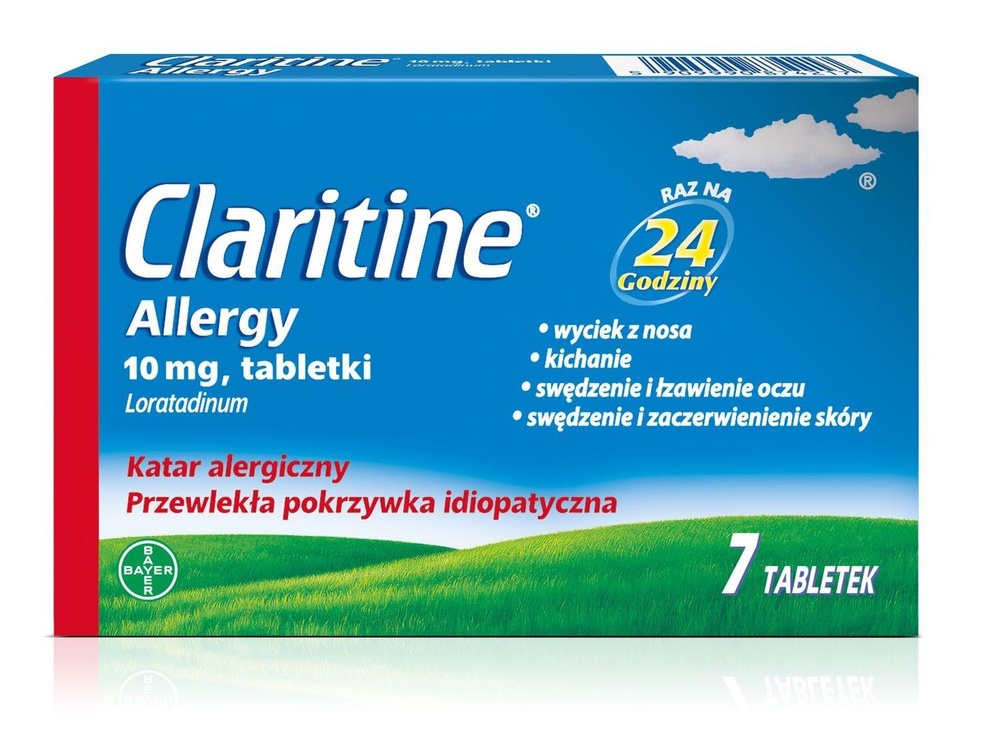

Claritine Allergi

Ask a doctor about a prescription for Claritine Allergi

How to use Claritine Allergi
Package Leaflet: Information for the Patient
Warning! Keep the leaflet! Information on the immediate packaging in a foreign language.
Claritine Allergy (Clarityne), 10 mg, tablets
Loratadine
Claritine Allergy and Clarityne are different trade names for the same drug.
Read the leaflet carefully before taking the medicine, as it contains
important information for the patient.
This medicine should always be taken exactly as described in the patient leaflet or as advised by
the doctor or pharmacist.
- The leaflet should be kept in case it needs to be read again.
- If advice or additional information is needed, the pharmacist should be consulted.
- If the patient experiences any side effects, including any possible side effects not listed in the leaflet, they should inform their doctor or pharmacist. See section 4.
- If there is no improvement or the patient feels worse after 3 days, they should contact their doctor.
Table of Contents of the Leaflet
- 1. What is Claritine Allergy and what is it used for
- 2. Important information before taking Claritine Allergy
- 3. How to take Claritine Allergy
- 4. Possible side effects
- 5. How to store Claritine Allergy
- 6. Contents of the pack and other information
1. What is Claritine Allergy and what is it used for
The active substance of Claritine Allergy, loratadine, is a tricyclic antihistamine, a selective antagonist of peripheral histamine H receptors.
Claritine Allergy is an anti-allergic medicine that does not cause drowsiness. Claritine Allergy
is indicated for the treatment of symptoms of allergic rhinitis (such as sneezing, runny nose, and itching, itching and burning of the eyes) and chronic idiopathic urticaria.
2. Important information before taking Claritine Allergy
When not to take Claritine Allergy:
- if the patient is allergic to the active substance or any of the other ingredients of this medicine (listed in section 6).
Warnings and precautions
Before starting to take Claritine Allergy, the patient should discuss it with their doctor or pharmacist:
- if the patient has severe liver impairment (see section 3. How to take Claritine Allergy).
Treatment with loratadine without a doctor's recommendation should not exceed 10 days.
Skin tests:
The patient should stop taking Claritine Allergy about 48 hours before scheduled skin tests, as antihistamines may cause false-negative results in these tests (may reduce or completely inhibit the skin reaction that would normally be positive).
Claritine Allergy and other medicines
Side effects may be increased when taking Claritine Allergy with medicines that affect the activity of certain enzymes responsible for drug metabolism in the liver. However, clinical studies have not shown an increase in side effects when loratadine is taken with medicines that affect the activity of these enzymes. Taking loratadine with ketoconazole, erythromycin, or cimetidine increases the concentration of loratadine in the blood, but without clinical consequences. Concomitant use of loratadine with medicines that affect liver metabolism should be done under medical supervision.
The patient should inform their doctor or pharmacist about all medicines they are currently taking or have recently taken, as well as any medicines they plan to take. This includes medicines available without a prescription.
Taking Claritine Allergy with food, drink, and alcohol
The medicine can be taken independently of meals.
Taking the medicine with alcohol does not increase its effects to a degree that can be measured by psychomotor tests.
Pregnancy, breastfeeding, and fertility
If the patient is pregnant or breastfeeding, thinks they may be pregnant, or plans to have a child, they should consult their doctor or pharmacist before taking this medicine.
As a precaution, it is recommended to avoid taking Claritine Allergy during pregnancy.
Loratadine passes into breast milk, so it is not recommended to take the medicine during breastfeeding.
There is no data on fertility in men and women.
Driving and using machines
In clinical studies, loratadine has not had a significant effect on the ability to drive and use machines. In some people, very rare cases of drowsiness have occurred, which may affect the ability to drive and use machines.
Claritine Allergy contains lactose monohydrate
The medicine contains lactose monohydrate as an excipient. If the patient has previously been diagnosed with intolerance to some sugars, they should consult their doctor before taking the medicine.
3. How to take Claritine Allergy
This medicine should always be taken exactly as described in the patient leaflet or as advised by
the doctor or pharmacist. In case of doubt, the patient should consult their doctor or pharmacist.
The dividing line on the tablet is only to facilitate breaking it for easier swallowing.
Recommended dose
Adults and children over 12 years old:
1 tablet (10 mg) once a day. The medicine can be taken independently of meals.
Children from 6 to 12 years old:
Body weight over 30 kg: 1 tablet (10 mg) once a day.
It is not recommended to take tablets (10 mg) in children with a body weight of less than 30 kg.
Patient with liver function disorders:
In patients with severe liver impairment, a lower initial dose should be used, as the clearance of loratadine may be reduced in these patients. In such cases, adults and children with a body weight over 30 kg should be given 1 tablet (10 mg loratadine) every other day.
There is no need to change the dose in elderly patients and patients with renal impairment.
In case of doubts about dosing, the patient should consult their doctor.
If the patient feels that the effect of Claritine Allergy is too strong or too weak, they should consult their doctor.
Taking a higher dose of Claritine Allergy than recommended
In case of taking a higher dose of Claritine Allergy than recommended, the patient should immediately consult their doctor or pharmacist.
After an overdose of loratadine, the following have been observed: drowsiness, increased heart rate, and headache.
In case of an overdose, the patient should receive immediate symptomatic and supportive treatment, which should be continued as long as necessary. Activated charcoal can be given as a water suspension. Gastric lavage can also be performed. Loratadine cannot be eliminated from the body by hemodialysis, and it is not known whether it can be eliminated by peritoneal dialysis.
After providing assistance, the patient should continue to be monitored.
There is no data indicating that loratadine causes abuse or dependence.
Missing a dose of Claritine Allergy
The patient should not take a double dose to make up for a missed dose.
In case of any further doubts about taking this medicine, the patient should consult their doctor or pharmacist.
4. Possible side effects
Like all medicines, Claritine Allergy can cause side effects, although not everybody gets them.
Common side effectsassociated with taking Claritine Allergy (in 1 to 10 out of 100 patients taking the medicine) are:
- in children from 2 to 12 years old - headache, nervousness, and fatigue.
- in adults and adolescents - drowsiness.
Uncommon side effectsassociated with taking Claritine Allergy (in 1 to 10 out of 1000 patients taking the medicine) in adults and adolescents are:
- headache, increased appetite, and insomnia, fatigue, gastrointestinal disorders such as nausea, dry mouth, gastritis, and allergic symptoms like rash.
Rare side effects(less than 1 in 10,000 patients taking the medicine), observed after the medicine was placed on the market, are:
- severe allergic reaction (including difficulty breathing, wheezing, itching, hives, swelling). If severe allergic reactions occur, the patient should stop taking the medicine immediately and consult their doctor.
- dizziness, seizures, increased heart rate, palpitations, abnormal liver function, hair loss.
Side effects of unknown frequency(frequency cannot be estimated from available data): weight gain.
Some people may experience other side effects when taking Claritine Allergy.
Reporting side effects
If the patient experiences any side effects, including any possible side effects not listed in the leaflet, they should inform their doctor or pharmacist. Side effects can be reported directly to the Department for Monitoring of Adverse Reactions to Medicinal Products of the Office for Registration of Medicinal Products, Medical Devices, and Biocidal Products,
Jerozolimskie Avenue 181C, 02-222 Warsaw, phone: +48 22 49 21 301, fax: +48 22 49 21 309,
website: https://smz.ezdrowie.gov.pl.
Reporting side effects can help gather more information on the safety of the medicine.
5. How to store Claritine Allergy
The medicine should be kept out of sight and reach of children.
Store in a temperature below 25°C.
Do not use this medicine after the expiry date stated on the packaging. The expiry date refers to the last day of the month.
Medicines should not be disposed of via wastewater or household waste. The patient should ask their pharmacist how to dispose of medicines that are no longer needed. This will help protect the environment.
6. Contents of the pack and other information
What Claritine Allergy contains
- The active substance of Claritine Allergy is loratadine. One tablet contains 10 mg of loratadine.
- The other ingredients (excipients) are: lactose monohydrate, corn starch, magnesium stearate.
What Claritine Allergy looks like and contents of the pack
Claritine Allergy is a white or almost white, impurity-free, oval-shaped tablet with a dividing line on one side and a smooth surface on the other.
Tablets are available in blisters (7, 10 tablets), in a cardboard box.
For more detailed information, the patient should contact the marketing authorization holder or parallel importer.
Marketing authorization holder in Greece, the country of export:
Bayer Hellas ABEE
Sorou 18-20, 151 25 Marousi
Athens, Greece
Manufacturer:
Bayer Bitterfeld GmbH
OT Greppin, Salegaster Chaussee 1
06803 Bitterfeld-Wolfen, Germany
Parallel importer:
InPharm Sp. z o.o.
Strumykowa 28/11
03-138 Warsaw
Repackaged by:
Pharma Innovations Sp. z o.o.
Jagiellońska 76
03-301 Warsaw
InPharm Sp. z o.o. Services sp. k.
Chełmżyńska 249
04-458 Warsaw
Marketing authorization number in Greece, the country of export:65448/2-10-2015
Parallel import authorization number:329/18
Date of leaflet approval: 03.11.2023
[Information about the trademark]
- Country of registration
- Active substance
- Prescription requiredNo
- Marketing authorisation holder (MAH)Bayer Hellas ABEE
- This information is for reference only and does not constitute medical advice. Always consult a licensed doctor before taking any medication. Oladoctor is not responsible for medical decisions based on this content.
- Alternatives to Claritine AllergiDosage form: Tablets, 10 mgActive substance: loratadineManufacturer: US Pharmacia Sp. z o.o.Prescription requiredDosage form: Tablets, 5 mg + 120 mgActive substance: loratadineManufacturer: SAG MANUFACTURING, S.L.U.Prescription not requiredDosage form: Tablets, 10 mgActive substance: loratadineManufacturer: Bayer Bitterfeld GmbHPrescription not required
Alternatives to Claritine Allergi in other countries
The best alternatives with the same active ingredient and therapeutic effect.
Alternative to Claritine Allergi in Spain
Alternative to Claritine Allergi in Ukraine
Online doctors for Claritine Allergi
Discuss dosage, side effects, interactions, contraindications, and prescription renewal for Claritine Allergi – subject to medical assessment and local rules.















